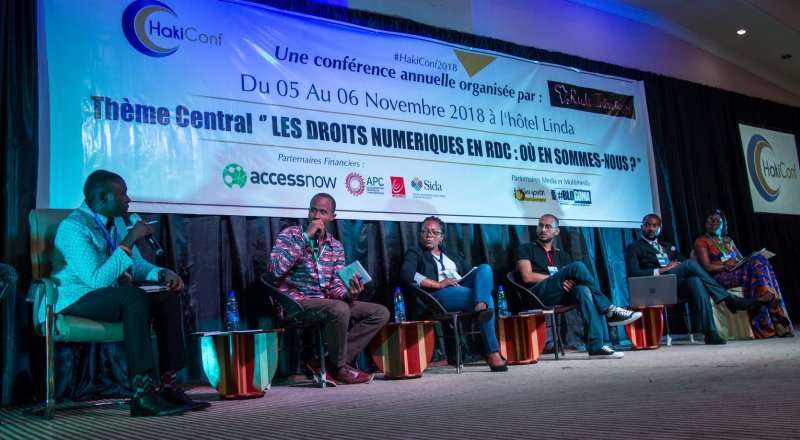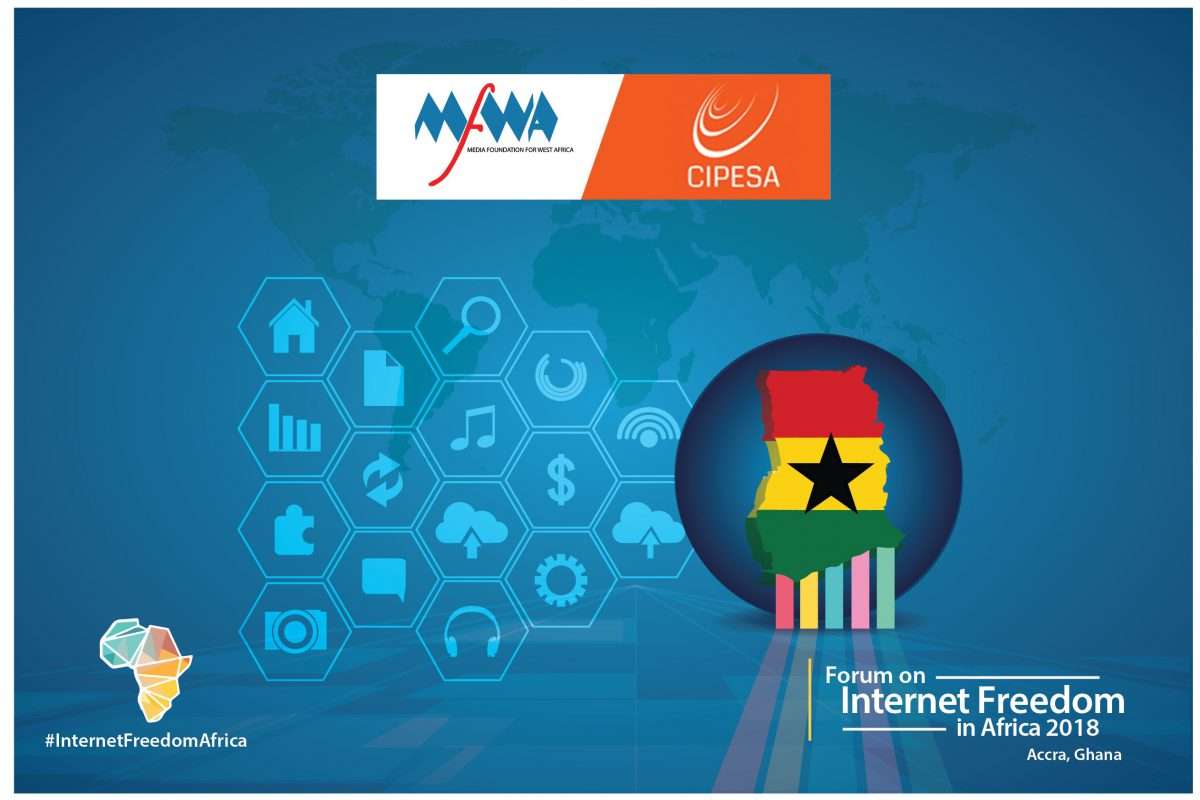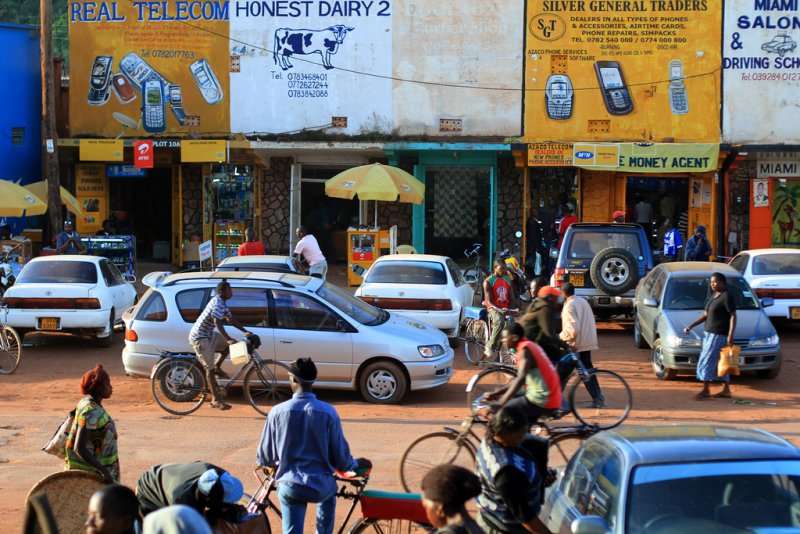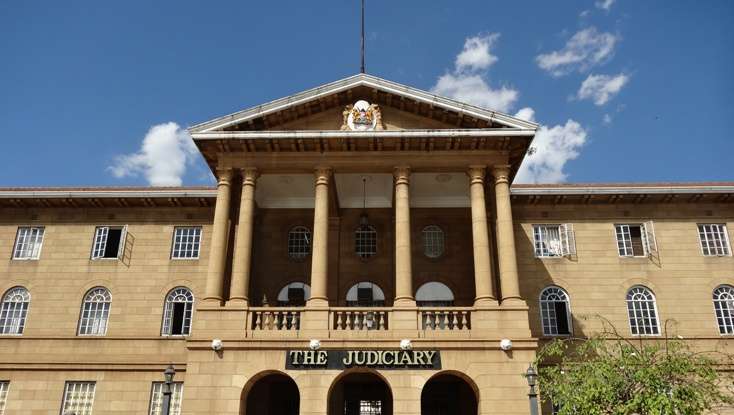Statement |
Civil society representatives, lawyers, and journalists from East and Central Africa have called upon their governments to develop policies that protect citizens’ digital rights and promote the use of the internet for free expression and for pursuing economic and education opportunities. The call was made amidst growing concerns that an increasing number of African countries are taking measures that restrict rather than promote the use of the internet. These measures include introduction of taxes that hinder access and use of Information and Communications Technology (ICT) and laws that hamper freedom of expression through ICT.
The call was made following a workshop on ICT Policy and Advocacy for actors from East and Central Africa, which took place in Goma, Democratic Republic of Congo. Hosted by the Collaboration on International ICT Policy for East and Southern Africa (CIPESA) and Rudi International on November 4–6, 2018, alongside the Haki Conference, the workshop drew 29 participants from Burundi, Kenya, DR Congo, Rwanda and Uganda.
Participants noted that the region faces similar challenges such as a lack of data protection laws, mass data collection efforts by governments and business entities, rising self-censorship by individuals and groups who fear reprisals for their online activities, gender-based cyber violence, and high perceptions of undue government surveillance on citizens’ communications. Moreover, some countries in the region have registered blockage of critical websites at the instigation of state authorities, while intimidation and harassment of independent bloggers and activists remain rampant, which affects freedom of expression and the free flow of information online.
In particular, participants urged the Rwanda government to amend its law on interception of communications to strictly define officers who can apply for warrants for monitoring of communications, to strengthen judicial oversight over interceptions activity, and to strictly guard the possibility for mass electronic surveillance.
Burundi was urged to enact a strong access to information law that requires state agencies to pro-actively release information, protects whistleblowers, and effectively advances citizens’ access to information online and offline.
Meanwhile, Burundi, DR Congo, Rwanda and Uganda, were urged to speed up the enactment of comprehensive privacy and data protection laws that strongly protect the integrity of users’ data and severely punish those who misuse such data. None of the countries in the region has a data protection law, although all require mandatory registration of SIM cards and are undertaking various exercises to collect massive amounts of citizens’ data.
In DR Congo, the lack of up-to-date laws to govern the telecommunications sector was noted with concern. Participants called on the National Assembly to expedite the enactment of the bill to update the outdated 2002 law on telecommunications, which is currently before the legislature. However, the parliament should widely consult civil society and the private sector and meaningfully integrate their inputs into the law to be adopted. Moreover, the DR Congo government should enact other ICT-related laws, such as on cyber crime and data protection; and take decisive measures to increase access to affordable fibre around the country, particularly in rural and under-served areas, and meaningfully invest Universal Service Funds in improving broadband access.
The region has this year seen the introduction of online content regulations that undermine the use of ICT. Tanzania and Uganda have started licensing online content producers at a fee, while in July, Uganda set a precedent by introducing taxes to access social media sites including Facebook, Whatsapp and Twitter. The DR Congo, which has ordered various internet disruptions in the last two years, also issued regulations in 2018 that require online publishers to register. .
Indeed, in the wake of these developments, participants called on states to develop laws that robustly stimulate the affordability and usage of the internet and related technologies as opposed to curtailing access to digital communications and stifling freed expression and access to information. The participants also shared their views at DR Congo’s first digital rights conference that concluded with the issuance of the Goma Declaration (French). The training in DR Congo was part of the CIPESA-run OpenNet Africa project (www.opennetafrica.org) which is working to grow the network of individuals and groups that work on advancing internet freedom and building their capacity to engage in digital rights advocacy.
MFWA to Co-Host Africa’s Biggest Internet Freedom Event
Announcement |
From September 26 to 28, 2018, the Media Foundation for West Africa (MFWA) will co-host Africa’s biggest Internet freedom forum in Accra, Ghana. The annual convening, which is dubbed Forum on Internet Freedom in Africa (FIFAfrica) brings together key stakeholders in the Internet governance and online/digital rights environment from the continent and beyond.
The MFWA will be hosting the forum jointly with the Uganda-based organization, Collaboration for International ICT Policy in East and Southern Africa (CIPESA). The forum is convened annually by CIPESA to deliberate on developments, challenges, opportunities and ways of improving the Internet ecosystem in Africa. Participants also adopt strategies aimed at enhancing citizens’ digital or internet rights on the continent.
This is the first time the FIFAfrica event is being held in West Africa. Last year’s event was held in South Africa while the maiden event in 2014 and subsequent editions were held in Uganda.
The internet has become a vital tool for enhancing freedom of expression, access to information and citizens’ participation in national discourse and governance. At the same time, it is the target of hostile policies and practices by some governments. It is thus important for all stakeholders to dialogue on how to preserve the internet for development.
“The MFWA is delighted to co-host this important continental forum on Internet freedom. There couldn’t have been a better time to host this event in West Africa as the region is currently witnessing significant developments and challenges in the internet environment,” said Sulemana Braimah, Executive Director of the MFWA.
Online freedom of expression has come under attack in recent years in Africa. Over the past one year, countries such as Kenya, Uganda and Tanzania have passed laws to restrict internet freedom. There have also been network disruptions and shutdowns in about seven African countries over the same period. Besides, there have been increasing incidents of arrest and detentions of citizens, bloggers and journalists for their social media activities.
The FIFAfrica event will also coincide with the International Day for Universal Access to Information (IDUAI), which is observed on September 28 each year. The day has been set aside by the UNESCO to mark the importance of universal public access to information and protection of fundamental freedoms.
The FIFAfrica event is scheduled to take place at the La-Palm Royal Beach Hotel in Accra, and is expected to host about 300 participants from dozens of countries in Africa and around the world.
You can learn more about the event by visiting the event website at: https://cipesa.org/fifafrica/ or follow the #FIFAfrica18.
For further information or inquiries, kindly contact Felicia Anthonio on [email protected] or +233 206 972 867.
This statement was originally published on mfwa.org on July 4, 2018 and Africafex.org.
Uganda: New social media tax will push basic connectivity further out of reach for millions
By Alliance For Affordable Internet |
Uganda’s government has passed a new tax that will require citizens to pay UGX 200 (US$0.05) per day in order to use messaging and voice over-the-top services (OTTs), including Facebook, WhatsApp, Twitter, and Viber. The tax, slated to take effect on 1 July, will push the cost of basic internet access further out of reach for millions of low-income Ugandans. The government must take urgent action to reverse this measure.
The Excise Duty (Amendment) Bill 2018, passed last week by the Ugandan Parliament, calls for telecommunications service operators providing data used to access OTTs to pay an excise duty on this access. According to Reuters, the country’s mobile network operators are likely to pass these costs on to consumers, levying a daily tax on each SIM card used to access the relevant platforms and services. The impact on consumers in Uganda — and particularly on low-income users — will be significant, and is likely to force many of these users to curb their internet usage, or to forego access entirely.
Only five other countries in Africa (where data was available) have more expensive mobile internet plans than Uganda. At the end of 2016, a 1GB mobile broadband plan in Uganda cost more than 15% of average monthly income. This high cost is keeping Ugandans offline — according to the GSMA, individual mobile internet subscriber rates in Uganda stand at just 18% of the population.
The true cost to connect is even higher for those earning less than the average national income (i.e., less than US$630/year). For the lowest income group in Uganda (see graph below), purchasing the same 1GB plan costs them 30% of their average monthly income. With the excise duty in place, this cost to connect for Uganda’s poorest will jump by 10%, resulting in just 1GB of data costing them nearly 40% of their average monthly income. The richest Ugandans will also experience an increase of 1% in their cost to connect, and by and large, this new excise duty disproportionately and negatively impacts low-income Ugandans and their ability to affordably access the internet.

he Ugandan government has argued that such a tax is necessary both to reduce gossip (“lugambo”) on these platforms, and to raise funds needed to address the impacts of comments made on social media that are critical of the government. However, it has not provided any explanation as to how such a tax might change what people say on the platforms, nor how the funds collected would be used to address these impacts.
The government has also argued that this tax will help promote local content development by placing a tax on “imported content.” As consumers increasingly shift toward data-based services, mobile operators will have new opportunities to develop and offer their own OTT services on their networks. However, the current language in the bill makes the duty applicable to all voice and messaging OTTs, including those that could potentially be developed by mobile operators or Ugandan firms. This is precisely why regulators in other countries have opted not to intervene on OTTs — so that local companies can innovate and create jobs and value in the telecoms market. The government of Nigeria, for example, previously considered a tax on internet use, which was eventually scrapped as a result of studies showing it would make access unaffordable for millions of people.
For other local firms that rely on voice and messaging apps for sales and service, for example when they use WhatsApp to communicate with customers, this duty will hurt their businesses. Finally, from a consumer view, these services offer value for money to communicate and share with others beyond what existing voice and messaging services can provide.
Stifling internet uptake and use is also likely to result in failure to achieve the goals laid out in the Digital Uganda Vision.The ICT sector contributed 3.4% to Uganda’s GDP in 2015, and increasing internet access has the potential to spur significant socio-economic growth — a recent study showed that a 10% increase in mobile broadband penetration can increase economic growth by nearly 3%.
We urge the government of Uganda to:
- Repeal the excise duty amendment before it goes into effect, and
- Adopt an evidence-based approach to policy making for the sector, with a specific focus on better broadband planning, increased public access solutions, innovative spectrum policy, and more efficient use of universal service and access funds.
By focusing instead on these areas, the government can have a far more positive impact on increasing internet access, and promoting local content development and innovation.
Featured image: Bustling street scene in Kabale, Uganda (Photo credit: Adam Cohn, CC BY-NC-ND 2.0)
Sections of Kenya’s Computer Misuse and Cybercrimes Act, 2018 Temporarily Suspended
By Juliet Nanfuka |
Barely two weeks after the presidential assent to the Computer Misuse and Cybercrimes Act, 2018, a High Court judge has issued a conservatory order suspending the entry into force of 26 sections of Kenya’s contentious Computer Misuse and Cybercrimes Act, 2018. The order by Judge Chacha Mwita, suspending the sections until July 18, follows a petition filed by the Bloggers Association of Kenya (BAKE), which challenged the law for contravening constitutional provisions on freedom of opinion, freedom of expression, freedom of the media, freedom and security of the person, right to privacy, right to property and the right to a fair hearing.
In the order issued on May 29, the judge certified BAKE’s petition as urgent, and stated that respondents (who include the Attorney General, the Speaker of the National Assembly, the head of the National Police Service, and the Director of Public Prosecutions) be served immediately. The respondents would have seven days from receipt to file written submissions. Hearing of the petition is scheduled for July 18, 2018.
Although the conservatory order only stalls the enforcement and could be lifted or maintained thereafter, it nonetheless represents a win for digital rights advocates in Kenya, as they have in the interim satisfied the judge that there is an arguable case to be made against the constitutionality of the recently enacted law. The order also marks another landmark ruling in the litigation towards respect and realisation of digital rights across Africa.
According to the order, the suspended sections are: 5, 16, 17, 22, 23, 24, 27, 28, 29, 31, 32, 33, 34, 35, 36, 37, 38, 39, 40, 41, 48, 49, 50, 51, 52 & 53.
Here are the orders by Justice Chacha Mwita barring the coming into effect of 26 sections of the Computer Misuse and Cybercrimes Act, 2018. pic.twitter.com/UvxAe9vTJG
— BAKE Kenya 🇰🇪 (@BakeKenya) May 30, 2018
Various organisations criticised the bill prior to its assent on May 16, 2018 calling it unconstitutional. Among the organisations were the Kenya ICT Action Network (KICTANET), Article 19 Eastern Africa, BAKE and the Centre to Protect Journalists (CPJ) who deemed numerous sections unconstitutional and detrimental to Kenyan citizens’ digital rights. They said it infringed on the privacy of individuals, freedom of expression, speech, opinion and access to information online.
Kenya already has a history of stifling online critics of the state and state actors, as echoed by James Wamathai, the Director of Partnerships at BAKE. In a statement, he said: “In the past several years, there have been attempts by the government to clamp down on the freedom of expression online. This Act is a testament of these efforts, especially after other sections were declared unconstitutional by the courts.
Among the prevailing concerns on the law is the use of vague language on issues such as “false” or “fictitious” content and false publications in Section 22 and 23, accompanied with heavy obligations on users to verify truthfulness or untruthfulness of information before disseminating. As per section 12, failure to comply would result in a fine of five million Kenyan shilling (USD 50,000), up to two years in prison, or both.
The court order comes on the heels of the two judgments (Okiya Omtatah Okoiti v The Communication Authority of Kenya and 3 others Constitutional Petition No. 53 of 2017 and Kenya Human Rights Commission v Communications Authority of Kenya and 3 others no. 86 of 2017) by the Kenya High Court in which the petitioners successfully challenged the installation on mobile phone networks of a communication surveillance system dubbed Device Management System (DMS), by the Communications Authority (CA) Kenya (CA). The petitioners argued that, through this system, the authority would have undue access to the communications of citizens.
As more countries in Sub-Saharan Africa develop technology related laws, it is fundamental that the laws uphold human rights standards prescribed at global and regional levels, including in the International Covenant on Civil and Political Rights (ICCPR), the African Charter on Human and Peoples Rights (ACHPR), and African Union Convention on Cybersecurity and Personal Data Protection. However, recent developments such as has been witnessed in East Africa appear to prioritise the criminalisation and penalisation of internet use rather than encourage its adoption as a tool for greater access to information, and for expanding free expression and civic engagement.
Kenya’s neighbours Tanzania and Uganda have this year taken actions detrimental to digital rights. In Uganda, social media taxes that could be introduced in July 2018 threaten internet access and affordability while in in Tanzania, online content producers will have to pay over USD 900 to register with the state for permissions to maintain their platforms, according to new regulations.
Privacy & Protection: Do Ugandans Care What Happens to Their Data?
By Neema Iyer |
Let’s be honest.
When was the last time you read the “Terms and Conditions” before you signed up for a new service online?
We don’t blame you. It’s easy to get lost in the legal jargon.
But do you know what happens to your personal data every time you click on “I have agreed to terms and conditions”? Did you know at the mere click to accept, you could have given a way a portion of your vital information and put your data privacy in absolute jeopardy?
Today, it’s hard to raise the issue of data privacy without putting a thought on the recent Facebook-Cambridge Analytica scandal that made many people realize the power of data. Even with as much information spewed out explaining what the scandal was about, very few took a note to learn from.
A recent allegation from the Cambridge Analytica scandal pins the Uhuru Kenyatta presidential campaign to have employed social media surveillance results to target campaign messages to different profiles of voters. This was possible because Facebook monitors your social media activity and can predict your behavior from that, hence such information is used to target messages that speak to your interests and emotions to sway major decisions such as election outcomes. This isn’t just happening on our doorsteps, allegations claim similar outcomes in the United States and the UK.
The EU revised as much on data privacy and protection in Europe and promised to give users more power over their data. While Europe seems to take quick action, down in Uganda and Africa at large, we continue to grapple with weak data privacy and protection laws, a citizenry that is not well-informed on data privacy, a delay in passing necessary bills and weak implementation processes. Unfortunately, a majority of African countries lack the necessary mechanisms for the inclusive participation of citizens and other stakeholders in the processes of formulating the very laws on internet and digital rights that directly affect them.
Do we care about Data Privacy and Protection?
In December 2017, Unwanted Witness, an activists group petitioned the Uganda Human Rights Commission (UHRC) to compel Parliament to speed up the enactment of privacy and data protection law.
They argued that without a governing law, citizens’ personal data is exposed to abuse without collection and protection safeguards. They further asked UHRC to prioritize privacy and recognize it as a fundamental right under attack in the country. However, to date, we are yet to see significant action taken to build an informed citizenry on their digital rights and to provide appropriate protections.
When talk about data arises, many are not really willing to delve further into the ethics surrounding the topic. This can and will still be attributed to the high illiteracy levels in the country and because many don’t know what data is or how valuable it might be on the long run, they will give it away easily. Funny as it may sound, a majority internet users think ‘data’ is the a term tied to the internet bundles that the ISPs provide and it’s that school of thought that has stuck with them. Whether their data gets in the hands of the wrong or the right people, it’s the least of their concerns.
Data Protection basically means to ensure the right to privacy, respect to confidentiality principles in various relations such as doctor patient, employer-employee and service providers with their clients generally.
Did you know that privacy is your human right?
The right to privacy refers to the concept that one’s personal information is protected from public scrutiny. It is essentially, your right to be left alone. Privacy is a core aspect of human dignity and values such as freedom of association and freedom of speech.
One would wonder, even with the data privacy breaches, are there really laws in place to curb and punish those that are misusing people’s data and evading on their privacy or we are simply looking while our data gets tampered with and is easily handed to the wrong hands.
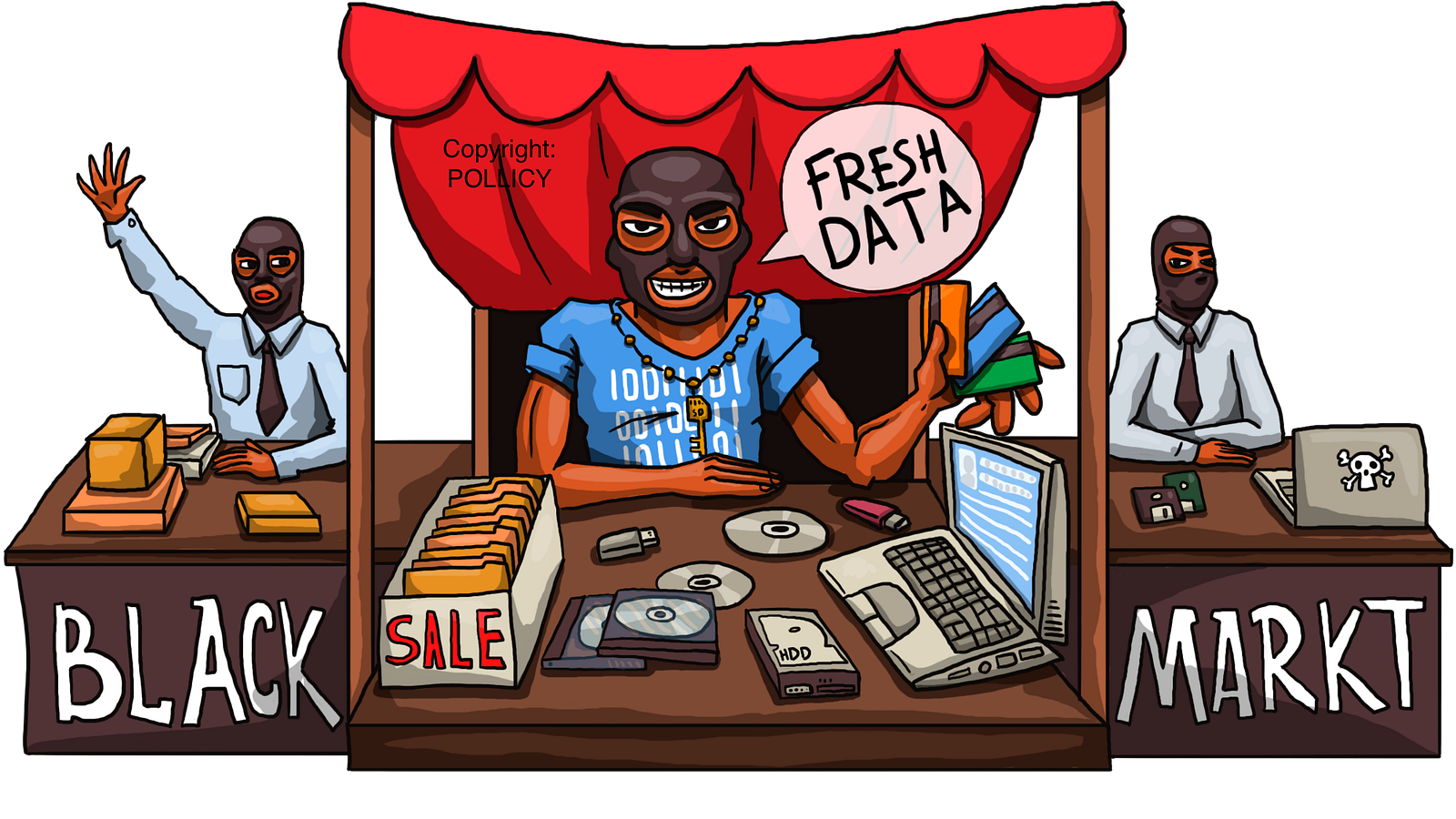
Are there Laws in Place?
Yes! There is a Ugandan Data Protection and Privacy Bill that was tabled before parliament in 2015 and although the Bill needs to be revised and aligned better with human rights provisions, comments have been raised on the need to balance civil liberties, national security and data protection and privacy.
According to a paper published a couple of years ago by Dr Ronald Kakungulu Mayambala a Senior Lecturer of Human Rights and Peace Centre at Makerere University, Article 27 of the Constitution guarantees the right to privacy of person, home and other property. In particular, article 27(2) of the Constitution provides that a person shall not be subjected to interference with the privacy of that person’s home, correspondence, communication or other property.
Unfortunately there is no comprehensive law giving effect to article 27, yet a lot of data concerning individuals are collected, stored or processed regularly by various institutions in the private and public sector, including banks, hospitals, insurance companies, the Uganda Citizenship and Immigration Control Board, the Uganda Revenue Authority, Uganda Registration Services Bureau, the Electoral Commission, utility service providers and telecommunications companies under the SIM card registration exercise
The Bill seeks to protect the privacy of the individual and personal data by regulating the collection and processing of personal information. It provides for the rights of persons whose data is collected and the obligations of data collectors and data processors; and regulates the use or disclosure of personal information.
However even with these laws and bills in place, further questions continue to be raised on whether they even hold any solid ground in implementation, especially, if there has not been enough sensitization of the bills and data literacy.
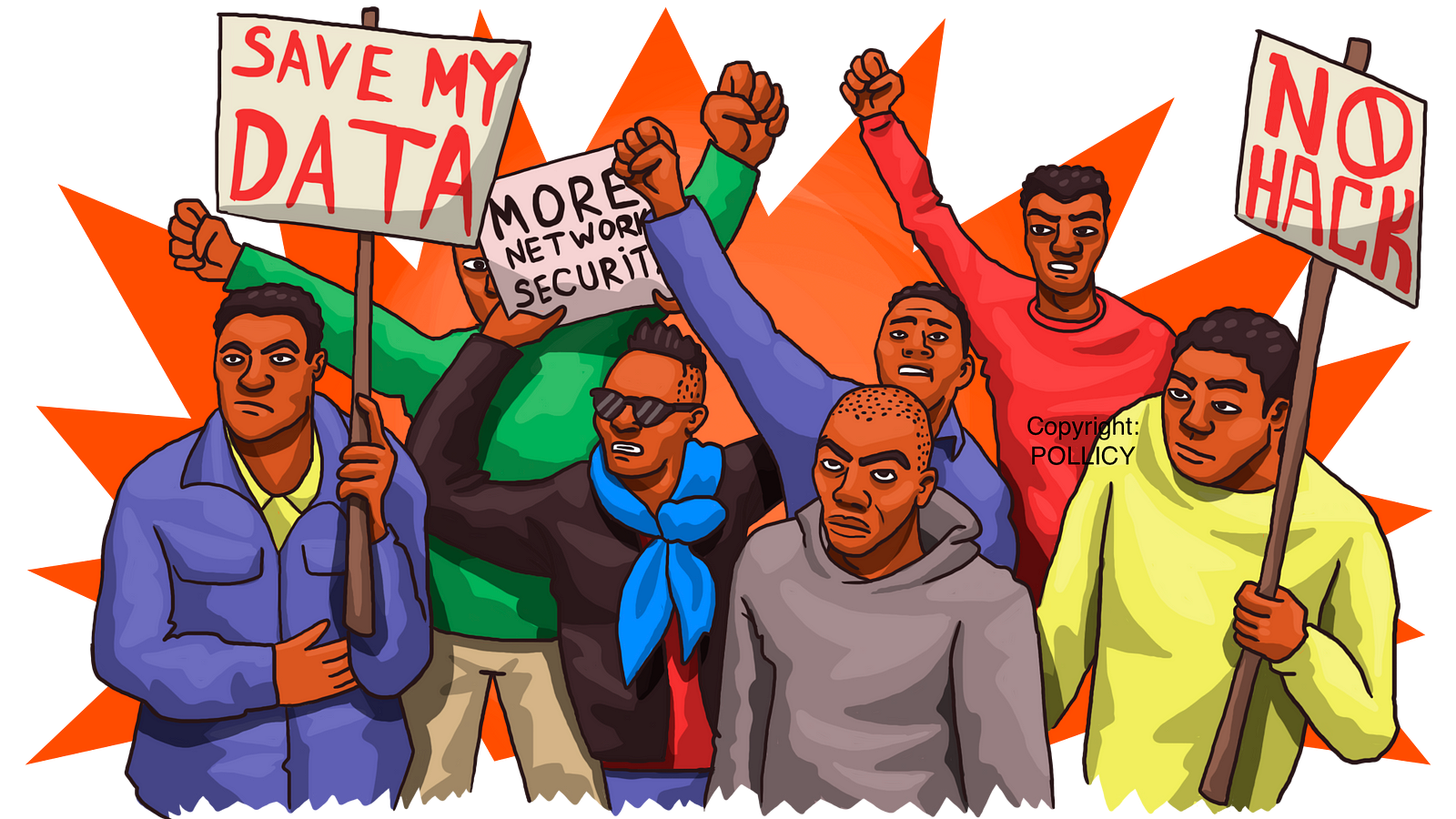
What do some people think about data privacy in Uganda?
A chat with a few random Ugandans around town shows you just how long of a way we have to go with the data privacy and protection talk.
“I honestly have nothing to hide with my data and anyone who wants to access it can go ahead and access it. Your data can only be private if you choose to keep it private but if you choose to put it out there and later claim for privacy, then you are playing yourself” — Lisa
“Whatever you put out there is public. I don’t really care who gets my data because once Ipost anything on social media, it’s no longer in any way private. I get a need for data privacy if it comes to my business data like emails. That is when i need some real privacy” — Hans
“Data privacy is not even a topic of debating here in Uganda because people don’t really care what happens with their data. Because we have a huge Internet penetration gap, very many people don’t even know what data is in most parts of africa.” — Emmanuel
‘Do Ugandans really Care About their #Data Privacy?’
— Pollicy (@PollicyOrg) April 29, 2018

